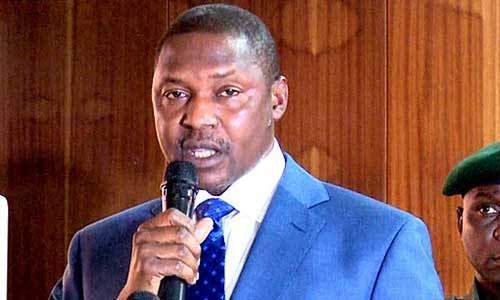Our attention has been drawn to an editorial published on May 4th,
2020 by The Punch newspaper, on the giant efforts of the office of the
Honourable Attorney General of the Federation and Minister of Justice,
Abubakar Malami, SAN in relation to the recovery of funds connected to
Abacha.
The initial reaction of the office was to ignore the editorial, as it was replete with misinformation, unsubstantiated allegations and vituperation of calumny with evinces lack of proper understanding of the issues implicated.
The Office of Attorney General of the Federation has, however, decided to respond thereto in order to clarify the issues involved in the overall interest of the public.
One wonders what insinuation The Punch is making by way of calling for
condemnation as against commendation over a recovery process having a
multi party states dimension involving a clearly spelt out agreement approved by the Federal Executive Council in the Nigerian circumstances.
The recovery of the funds brought embarrassment to nay-sayers and pessimists who wanted to frustrate the process through unfounded
information and groundless allegations. Hence, resorting to figment of imagination and opinionated writing of antagonism in the name of
editorial.
The editorial was marred by unsubstantiated claims as it has failed to address the so called “angst that replaced the elations that greeted
the recovery”. Why angst? By whom and how? How has concerted efforts that culminated into successful transfer of the funds that were to be used for the execution of people-oriented projects enmeshed in
scandals? What were the unconvincing denials by government that the
recovered funds will be strictly used for the projects agreed in the repatriation agreement?
How does punishment fits into the conduct of United States of America in submitting to repatriation of the looted assets, the Bailiwick of Jersey for conceding to the repatriation of the funds and Nigerian Government whose Federal Executive Council sanctioned the execution of
the agreement on the basis of which terms the repatriation was
executed?
The Federal Republic of Nigeria is a democratic and sovereign country which cherishes the ideals of freedom of speech and expression. To that extent, citizens are free to express their opinions- albeit consistent with the limits espoused by the Constitution and other
relevant laws sanctioning free speech. It is in this context that the editorial by the Punch Newspaper is flawed on its commentary on the receipt of the over $311 million as repatriated loot from the United
States of America. The flaws are apparent in two fundamental areas of
the law.
Read Also:
First, the editorial piece lack of understanding governing the dynamics of sovereignty of a nation. Section 2 (1) of the Constitution 1999 (as amended), guarantees the sovereignty of the country as the Federal Republic of Nigeria. Attendant to this is the fact that at international law, Nigeria is at liberty to engage in relations that
will enhance her development, prosperity, respect and standing in the
international arena.
Second, it is against this pedestal that Nigeria acceded to the United
Nations Convention Against Corruption. This Convention is a binding multilateral treaty, amongst others, dealing with the repatriation of looted assets which have been tainted with corruption. It is in the same context that the return of the over $311 million is to be viewed.
Article 4 of the Convention guarantees the protection of the sovereignty of Nigeria. Nigeria signed a tripartite agreement with the United States and the Bailiwick of Jersey. Nigeria, acted through its executive authority as enshrined in section 5(1) of the Constitution of the Federal Republic of Nigeria, 1999 to formalize the multi-party
agreement culminating in the return of the over the $311 million.
Importantly, Article 7 (4) of the United Convention Against Corruption
guarantees that each Party shall in accordance with the fundamental principles of its domestic laws, endeavor to adopt, maintain and strengthen systems that will promote transparency and prevent conflict of interest. This informed the decision of Nigeria to subject the
received funds to civil society oversight. The utilization of the funds for specific purposes, such as the construction of the Ibadan- Lagos expressway, the third Niger bridge and the Abuja- Kano expressway are clear testimonies to the sincerity of purpose by the
Federal Government in respect of how the funds will be utilised.
The funds will be managed by the Sovereign Trust Fund and the proposed projects will undergo all public procurement processes and quality audit to ensure that Nigerians benefit from the recovered proceeds.
These are all development processes consistent with the spirit in which the tripartite agreement was signed, the principles of Nigeria’s national sovereignty and the laws of Nigeria.
The stark choice facing Nigeria before the initiation of the Federal Government’s efforts to recover the looted funds was either to totally
forfeit the funds by taking no action or to take all proactive steps to recover the funds. Given this obvious reality, Nigeria should actually be commended for this bold initiative to engage jurisdictions where the funds are located to mutually pursue avenues that will help Nigeria recover those looted funds amicably. That was the reasoning and the wisdom behind Nigeria’s decision to utilise the instrumentality of a legal process incorporating the roles of the United States of America and the Bailiwick of Jersey to repatriate the
looted funds.
In matters of serious national interests, media outlets have a civic responsibility to eschew sentiments and comment on issues objectively.
One wonders, therefore, where the editorial piece of the Punch Newspaper stands on this colossal recovery of funds stolen from Nigeria and now returned. The duty of journalism is to inform not to distort.



























